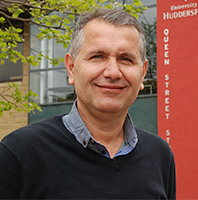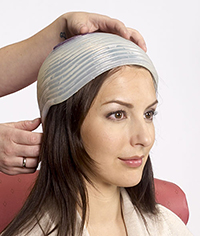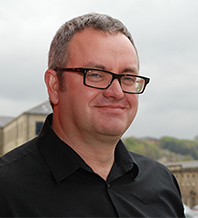Uni designer’s 3D technology to improve Paxman scalp cooling cap
Fri, 15 May 2015 14:44:00 BST
Redesign the cooling cap – to fit the head more efficiently, improve the flow pattern and be mass-manufactured
UNIVERSITY of Huddersfield expertise in 3D printing technology and computer-aided design is helping an innovative company to establish itself as the global leader in the manufacture and sale of devices to prevent distressing hair loss during cancer treatment.
The firm is Huddersfield-based Paxman, which has developed a highly fruitful relationship with its local university, participating in research which has established the scientific basis for scalp cooling. A Knowledge Transfer Partnership (KTP) devoted to this has just been adjudged “outstanding” by the Technology Strategy Board.
Another key collaborator with Paxman is Dr Ertu Unver, who is Principal Enterprise Fellow in Product Design at the University’s School of Art, Design and Architecture, where a team including Dr David Swann and Chris Howard have been working on improvements to the cap that is worn by the patient during chemotherapy and which can eliminate hair loss.
 Dr Unver (pictured top left) was briefed to redesign the cooling cap so that it is a better fit – vital if the device is to be effective – and could be mass-manufactured. The cap that he has developed, made from silicon, fits the head more efficiently, despite a reduction in the range of sizes. He has also been able to improve the flow pattern of the coolant that cools the head.
Dr Unver (pictured top left) was briefed to redesign the cooling cap so that it is a better fit – vital if the device is to be effective – and could be mass-manufactured. The cap that he has developed, made from silicon, fits the head more efficiently, despite a reduction in the range of sizes. He has also been able to improve the flow pattern of the coolant that cools the head.
These breakthroughs came after a three-year project for which the Technology Strategy Board provided funding via Paxman. Dr Unver conducted extensive research into UK head sizes, and used a 3D scanner to produce a model of the optimum head shape. Then 3D printing was used in order to output a tool – or mould of the cooling cap – made using Selective Laser Sintering (SLS) 3D printing technology.
Having made these breakthroughs – using advanced design and manufacturing techniques – Dr Unver, his University of Huddersfield colleagues Dr Swann and Professor Mike Kagioglou plus the Paxman firm have been awarded a new £161,484 KTP from the Government-backed Innovate UK.
 Pictured left Dr David Swann. Pictured right the first-generation of the Paxman scalp cooling cap.
Pictured left Dr David Swann. Pictured right the first-generation of the Paxman scalp cooling cap.
The goal now is to develop a third-generation cooling cap. It will involve designing the cap with alternative new manufacturing methods and 3D printing technology and further improvements in productivity. This will not only reduce any risk of contamination but will also help Paxman establish itself as the market leader in the US and the Far East, including Japan.
A KTP Associate – a design graduate with appropriate skills – is now being recruited for the three-year project. Also, Paxman and Dr Unver are applying for two patents to cover their breakthroughs in design and technology.








